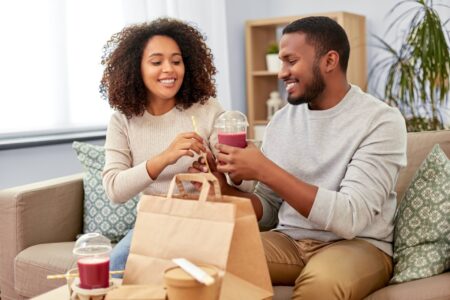When you need a night off from kitchen duties, and dining in at restaurants isn’t an option, meal delivery services can be a convenient alternative. In fact, for many of us, food delivery services have been a lifesaver during this year’s pandemic.
But is food delivery safe?
The answer depends on what you mean by “safe.” According to the Food and Drug Administration, the Centers for Disease Control and Prevention and the U.S. Department of Agriculture, there is currently no evidence to suggest COVID-19 can be transmitted through food or food packaging. To the best of the scientific world’s knowledge, coronavirus spreads from person-to-person through close contact or respiratory droplets, for instance when a person coughs or sneezes. There may be a small possibility viruses will survive on surfaces and objects, reinforcing the need to observe proper hygiene and food safety practices.
That means when you have food delivered you should practice social distancing, maintaining a distance of six feet whenever possible. You should always implement proper food safety practices—frequently washing hands with soap and water and washing surfaces and utensils with hot soapy water after each use—while preparing foods.
Regular handwashing, routine cleaning and disinfecting frequently touched surfaces remain the most effective ways to reduce the spread of COVID-19.
But even before coronavirus was a thing, surveys revealed that 1 in 4 delivery drivers admitted to eating customers’ food on the way to their destination.
That’s where GrubGuard, a patent-pending hardware and software solution that protects food delivery contamination and package tampering developed by husband and wife duo Shaunta and Zachary Jones, comes in. Right now restaurants are using a staple or stickers method of sealing delivery bags. With contact-less delivery, you might not know your food has been tampered with until the driver has left. “There’s a blind spot between restaurant and customer’s home,” Shaunta Jones said.
“We saw about two years ago the emergence of food delivery services. Everyone’s focusing on delivering the food, but no one’s focusing on the protection of the food while it’s being delivered,” she said. “We never could have predicted that coronavirus would occur.”
GrubGuard technology applies to a wide variety of food delivery packaging methods, including a clip, bag or box. “The alert looks like a green closed lock, which means food hasn’t been tampered with. The lock will turn red and open if something happens to your food in transit,” Jones said. “And there will be an audible.”
DoorDash and UberEats say they deactivate accounts with drivers who tamper with food, and Grubhub opens an investigation and issues customers a refund. Postmates requires delivery personnel to agree that all food and goods delivered will arrive in a tamper-free form and in compliance with all applicable food health and safety laws.
None of these actions, however, guarantee safe arrival of your food. GrubGuard does.
“Simply put, GrubGuard is the champion for restaurants and guardian for consumers,” Shaunta Jones said. “We protect food deliveries with our tamper-proof technology that offers layers of security, allowing costumer notifications if there is a breach during transit.”







